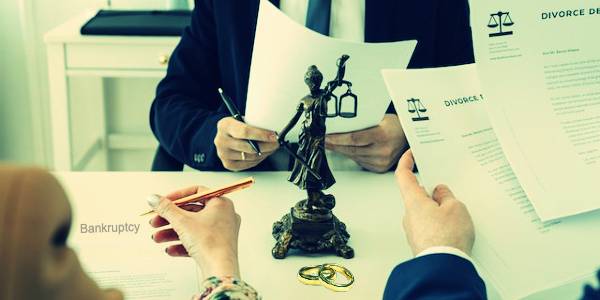Divorce is one of the most common reasons for people to declare bankruptcy. A divorce can be costly, more so than most assume, and it entails the dissolution of the household and the end of the financial benefits of marriage. You no longer share rent or mortgage payments.
In addition, the divorce procedure can be costly in terms of court and other legal fees. The divorce procedure is expensive, and people may be financially burdened by the cost of resuming their lives, alimony, or child support following the divorce.
Let's look at how divorce can lead to debt and bankruptcy and how you can bounce back.
How And When Divorce Leads To Bankruptcy
Divorce rates in the United States have risen in recent years, particularly after the global pandemic. And if finances are in bad condition, bankruptcy is a leading concern after divorce. Incomes typically go down following a divorce, and if someone was not eligible for bankruptcy before the divorce, they might be after it.
Ending a marriage often leads to debt and a lot of financial uncertainty. Usually, a divorce decree will say how the couple's debt will be split. After the divorce, one ex-spouse may decide to file for bankruptcy as they cannot afford to pay the ordered debt.
Another factor leading to bankruptcy might be that after divorce you must now pay all your bills. It is possible that your spouse was previously paying all or a part of the bills. This leads to a dramatic shift in lifestyle. Even if you are willing to downsize your expenses, it is still an expensive transition to make.
You might have to move out, restart your work life, or perhaps you may have to start paying alimony and child support. Tiffany Homan from Texas Divorce Laws said, "one household is typically supported by two incomes, so it becomes challenging to downsize your life to match your tightened budget when you suddenly find yourself responsible for all the bills." Needless to say, divorces can be extremely expensive, and it's not a surprise that not everyone can handle the financial burden of it all.
On the flip side, there's a chance that your ex-spouse ends up filing bankruptcy after divorce first because of the reasons mentioned above. That might make creditors pressure you to collect all of the mutual debts, and in the end, this might force you to also file for bankruptcy.
Even though men usually have higher incomes and more debt, women are often hurt more by a divorce. When women get custody of the kids and have lower incomes, it can be hard to pay all the bills, and it's not easy to be the higher earner in a divorced couple with debts.
Partners who used to bring in the most money for the family can get stuck with alimony and high child support payments that leave them with little money to pay their bills, especially if their income drops after a divorce.
How To Bounce Back From Bankruptcy After Divorce
Even though divorce doesn't directly affect a person's credit score, things that happen after a divorce can also hurt credit scores When you declare bankruptcy, it hurts your credit score and makes it hard for you to get loans or credit cards for a long time.
Rebuilding credit after bankruptcy isn’t easy; it takes time, patience, and good financial habits. You can apply for a secured credit card to improve your credit score. Make consistent and on-time payments, as payment history accounts for 35% of your credit score. Keep low balances on credit cards and build an emergency fund so you don't have to depend on them for unexpected expenses.
Credit builder loans are another great way to improve your credit score. With it, the creditor holds a certain amount of money in a savings account in your name while you pay off the loan.
"One way to bounce back is by working with an attorney who specializes in family law matters. They'll ensure that your divorce is executed in accordance with your legal rights and that any debts accrued during the marriage are paid off fairly and equitably so that neither party feels like they got a raw deal out of this divorce agreement," said Shaun Connell, CEO of Connell Media.
The amount of time the bankruptcy will stay on your credit report depends on the type of bankruptcy you file. A Chapter 7 bankruptcy stays on your credit report for 10 years, and Chapter 13 stays for 7 years. You can expect your credit score to improve 1 to 2 years after filing for bankruptcy.
The last thing you want after going through bankruptcy is for history to repeat itself. You need to adopt good financial habits like building an emergency fund that can support you during unexpected financial crises, during joblessness, or a medical emergency.
You also need to have a budget to have more control over your money. Using a budget, you can allocate your income toward necessities, track your overspending habits and know what to cut from your list of expenses. All of this will help you prevent accruing bad debt ever again.
The Bottom Line
Divorce has often pushed people towards filing for bankruptcy. Ending marriages can be costly for both parties involved. The best thing to do is talk to your ex-partner about what you each plan to do. Filing for bankruptcy together can be more efficient than filing individually.
The bankruptcy will wipe out both spouses' qualifying debts, so there will be less to decide in divorce court, and it costs less to file bankruptcy together.
The best way to determine whether or not bankruptcy should be included in a divorce is to consult with an experienced attorney. Remember to inform your attorney that divorce and bankruptcy both are a possibility to avoid potential conflicts and maximize the effectiveness of either filing.









